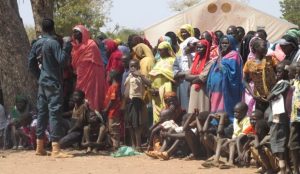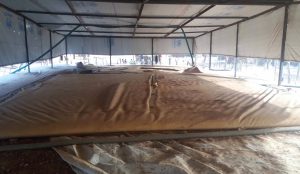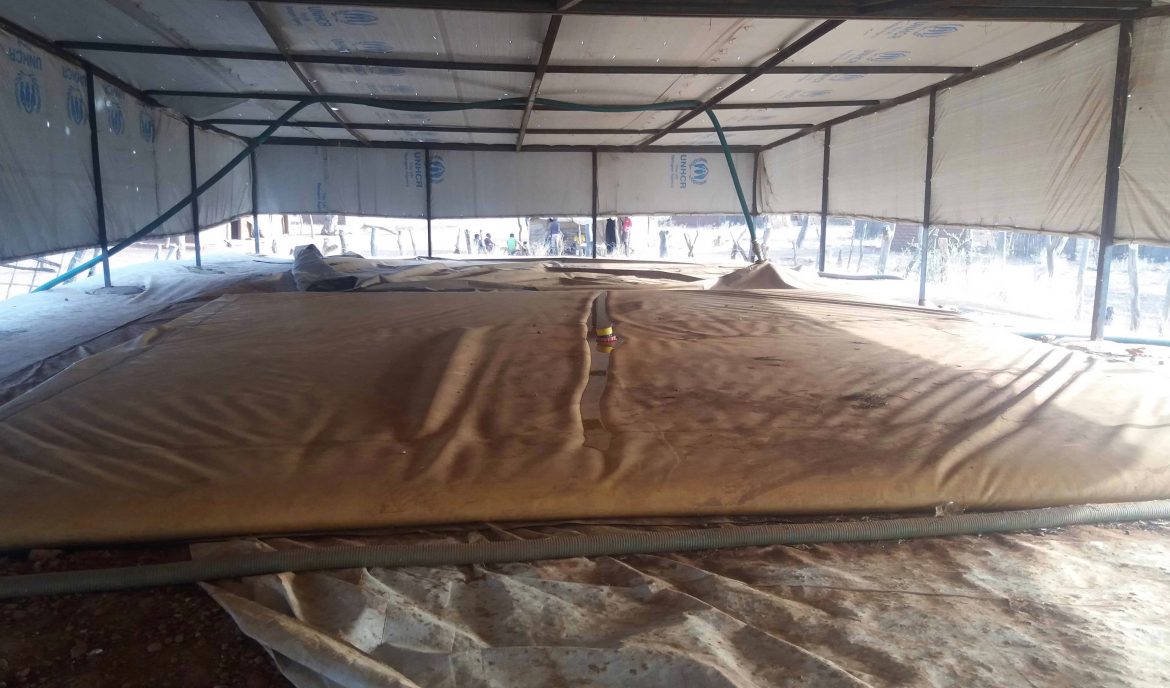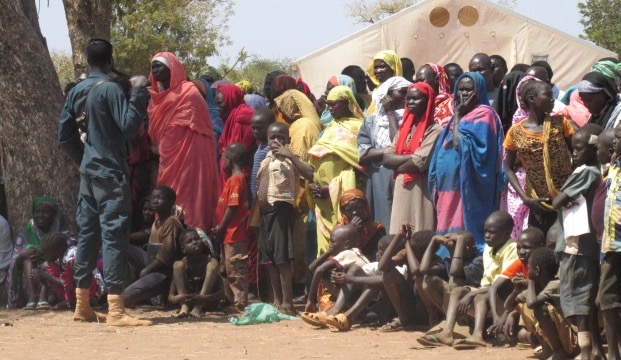“Our problem is all about water,” says Azza Samir, a refugee from Sudan’s restive Nuba Mountains who has made a new home in neighboring South Sudan.
Samir fled across the border to Yida, a town in Ruweng State, after Sudan airplanes bombed near her house. While access to water was always a challenge in the Nuba Mountains conflict zone, Samir said, finding water points in Yida, South Sudan, is also proving onerous.
Since mid last year, few of the borehole pumps are operational, forcing refugees to spend their days looking for and competing over increasingly diminishing water sources.
“Sometimes you go in the morning, wait in vain, and then wait to hear whether other pumps are working,” Samir said. “Any rumor of possible water forces us to rush to another pump, which also may or may not be working.”
It was not always like this. According to James Habib, who manages one of the borehole water pumps in the camp, water was sufficient up until last year and especially plentiful from October 2016 onwards.
“The problem is all about fuel,” Habib said. “In 2015 when we were working with 20 litres [of fuel] we used to open the borehole pumps from 6:00 am up to 7:30 pm or beyond depending on the numbers of people.”

Yida refugees attend a public meeting with UNHCR in February 2016 (Nuba Reports)
In July of 2016, the UN Refugee Agency (UNHCR) rolled back services in Yida while pushing for refugees to relocate to two newer camps, Ajuong Thok and Pamir. UN officials claimed the camp does not comply with UN regulation standards and is militarized –acting as a training camp for the rebel movement in the Nuba Mountains– an allegation the Yida refugees and other aid workers deny.
UNHCR made the decision to gradually cut fuel supplies to the Yida refugee water pumps early in 2016, according to an international aid worker in Yida, preferring anonymity. Previously, UNHCR provided 7,500 litres of fuel per month for water operations but then cut this supply to 5,000 litres in July last year. Every month since last July the fuel was cut by 500 litres per month, the same source said. Reduced to 500 litres per month today, the fuel provided by the UN refugee agency is not even enough to fuel one water pump generator.
“In fact, UNHCR gave up on supporting the refugees in Yida with all kinds of services since 2016,” says Al-Nur Al Saleh, chairman of the Yida Refugees Council. There were 14 boreholes operating in the sprawling Yida camp with 10 using diesel fuel and four others using solar power, Saleh explained. The fuel cuts have essentially reduced the borehole operations to a handful of water sources for South Sudan’s largest refugee camps.
“The fuel cuts have really affected life for the refugees in Yida,” says Chris Low, an engineer and founder of the faith-based development organization, Yokefellows. Besides water’s general use for drinking, cooking and bathing, it is also used for building.
“People build their houses using bricks they make themselves,” Low said. “There is no available water this time of year here so they need borehole water to be able to build shelters for themselves, an often overlooked issue.”

A UN water bladder in Yida (Nuba Reports)
Low has been helping the aid organization Samaritan’s Purse to convert the diesel-powered water pumps into solar-powered systems. “This has helped ease the problem in some parts of the camp,” Low said. “They [Samaritan’s Purse] have worked very hard to keep delivering water to people despite not having any UN funding.”
UNHCR says the gradual fuel reductions are consistent with the Government of South Sudan’s decision and directives on Yida, says UNHCR Reporting Officer Juliette Stevenson. The UN agency has solarized some of the boreholes, Stevenson said, and assisted conversion of three low yielding boreholes to hand pumps to ensure some water accessibility continues.
Despite these efforts, many refugees are leaving Yida and returning to the Nuba Mountains – where the conflict is entering its sixth year and aid is blocked. Others are relocating to other refugee camps due to the water shortages, said Al Saleh, with the refugee council. .
“In my opinion, UNHCR is doing this to the refugees to force them to accept and relocate to the new camps,” he said.
The water cuts, among other factors, have certainly contributed to the depopulation of the camp. In early 2016, there were 77,000 registered refugees, while today that number is roughly a third less at 54,0000. Meanwhile, both Pamir and Ajuong Thok camps have plentiful water supplies, Stevenson said.
But among refugees in Yida, there is widespread opposition to relocating to these camps. Musa, like many of the Yida refugees, plans to go back to the Nuba Mountains if the water shortages continue and refuses to go to Pamir due to fears of insecurity. Pamir is located near border areas where Sudan government-backed militias operate and lacks access points back to the Nuba Mountains, Al Saleh said.
Samira Tia, a refugee in Yida, is also planning to return to the Nuba Mountains since she fears insecurity in Pamir and Ajuong Thok has now reached its capacity.
“If you are just going to cut grass or collect firewood, they [the host community] can rape you,” Tia said. Sadly, Tia is speaking from personal experience having been attacked near Pamir while collecting firewood in a nearby forest. She did not report the case since she has little confidence in the local authorities to follow up her issue. “These are the type of things that have convinced me not to go to Pamir,” Tia said.
Yousif Kuti has lived in the camp from the very beginning, when Nuba people fled the conflict in the neighboring Nuba Mountains in Sudan and started clearing and building Yida camp themselves. Keeping this can-do spirit, Kuti is now collecting donations from fellow refugees to buy fuel for the water pump generators.
“It’s hardly enough, but what to do?” Kuti said. “Yida has become home and I am going to stay.”






